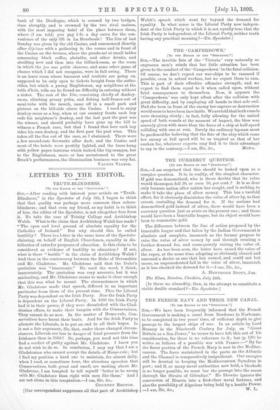LETTERS TO THE EDITOR.
TRUTH-BLINDNESS.
ITO THE EDITOR OF THE " SrucTAToo."1 SIR,—After reading with interest your article on "Truth- Blindness," in the Spectator of July 8th, I began to think that that quality was perhaps more common than colour- blindness ; and that even my friend, as my habit is to think of him, the editor of the Spectator, is not altogether free from it. To take the case of Trinity College and Archbishop Walsh. What is the claim that Archbishop Walsh has made ? " The open and level ground of absolute equality for the Catholics of Ireland." But why should this be called hostility ? There is a letter in the same issue of the Spectator claiming, on behalf of English Churchmen, equality in dis- tribution of rates for purposes of education. Is this claim to be considered as evidence of hostility to education P If not, what is there " hostile" in the claim of Archbishop Walsh P And then in the controversy between the Duke of Devonshire and Mr. Gladstone. Mr. Gladstone said that the Duke's quotation was " inaccurate." He used the word, I think, inaccurately. The quotation was very' accurate, but it was misleading, and Mr. Gladstone seems to make it clear enough that this was what he meant. The circumstances in which Mr. Gladstone made that speech, differed in an important particular from those of the present time. Then the Liberal Party was dependent on the Irish Party. Now the Irish Party is dependent on the Liberal Party. In 1886 the Irish Party had it in their power, if they were dissatisfied with the Glad- stonian offers, to make their bargain with the Conservatives. They cannot do so now. In the matter of Home-rule, Con- servatives have burnt their boats. And for the Irish Party to alienate the Liberals, is to put an end to all their hopes. Is it not a fair argument, Sir, that, under these changed circum- stances, Liberals are less in danger of fatal pressure from the Irishmen than in 1886 P So, perhaps, you need not this time find a verdict of guilty against Mr. Gladstone. I know you do not wish to do so. In conclusion, I may say that I am a Gladstonian who cannot accept the details of Home-rule ; but I find my position a hard one to maintain, for almost daily, when I read, or sometimes hear, the atrocious speeches that Conservatives, both great and small, are making about Mr. Gladstone, I am tempted to tell myself better to be wrong with Mr. Gladstone than right with men like these.' And I am not alone in this temptation.—I am, Sir, &O., COUNTRY RECTOR.
[Our correspondent suppresses all that part of Archbishop Walsh's speech which went far beyond the demand for equality. In what sense is the Liberal Party now indepen- dent of the Irish Party in which it is not equally true that the Irish Party is independent of the Liberal Party, neither truth having any practical meaning P—En. Spectator.]


































 Previous page
Previous page